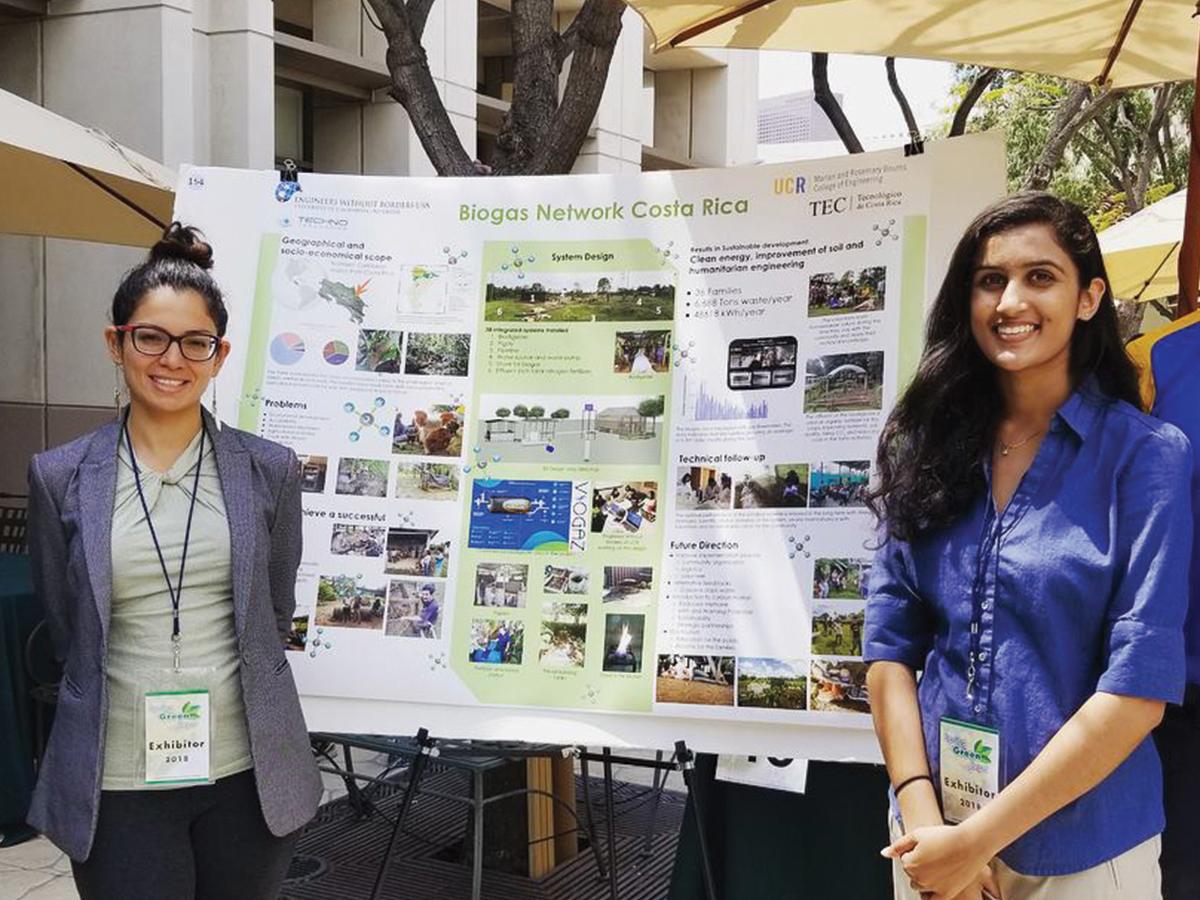One of the teams within UC Riverside’s Engineers Without Borders (EWB), a chapter under the Inland Empire professional chapter, took home first prize for the team category at the 11th annual Metropolitan Spring Green Expo on Thursday, April 19. The competition was held in downtown Los Angeles where the UCR team competed with teams from other universities, including Loma Linda University and UCLA. Another UCR team won second place for developing water-efficient scrubbers that reduce ammonia waste produced in dairy facilities.
The victory was accredited to Claudia Chaves Villareal, a doctoral student from the Costa Rica Institute of Technology. She started the project in 2012 when she began a company with a partner to provide biogas systems for impoverished communities in Costa Rica. This was requested by the communities in order to find an alternative to the faulty biodigesters, airtight containers for aerobic digestion, which were given to them by the government. Since then, she and her project team within EWB focused on improving the current design through the problems they came across.
In addition to this, they are looking for more grants to use for improving the biogas systems and other concurrent projects. Villareal recognized how important it was for the students to be involved in this project in order to learn new skills such as writing grant proposals and using concepts learned in class. “It helps the students apply their knowledge they learn in classes and apply it to real problems in developing countries,” Villareal said. “They extend their capabilities, not only to know the fundamentals of the sciences and technology, but also to know how to apply that in a completely different context.”
Villareal also commented on how the victory reminded the team of their accomplishments in the real world. “I think it motivates the group to realize how this is important, because there were many well-developed projects that were well-thought,” she said. “But winning first place lets them know how important the (metropolitan) water district considers this project to be, because it is more applied and we have already delivered results.”
The biogas systems use pig waste as fertilizer in order to convert it into an eco-friendly gas for domestic use. The team plans on purchasing two pigs for the family to begin the system and converting their biological waste into a type of gas. This is made in lieu of using rainforest wood for cooking fuel and other domestic uses that produce excess carbon dioxide, potentially causing more health hazards within these communities. In addition, these families are able to sell excess gas energy and the fertilizer for other families to use.
Project leader and third-year bioengineering major Amani Sastry shared how her role has given her a new perspective on the different realms of engineering. “As a bioengineer, I was definitely introduced to a lot of the environmental and chemical engineering side,” she said. “It broadened my perspective on the humanitarian engineering and how bioengineering can be useful in this certain field.”
Dr. Kawai Tam, UCR associate teaching professor and the faculty advisor for EWB, shared that the UCR team has consistently attended the Spring Green Expo and been placed in the top two since 2005, with an exception of one year. However, in spite of the many accomplishments she has witnessed under the Bourns College of Engineering, she feels as though the school’s reputation hasn’t kept up with their accomplishments and that more brand recognition for the school’s hard work would allow UCR to further develop its reputation. For Tam, competitions such as the Spring Green Expo demonstrate “the caliber of quality people that we mentor and mold and come out into society.”
Other project members were delighted to be involved with the team and the progress they had made, receiving more grants and awards for their project. Stephanie Kim, the financial director of EWB, explained that the club has given her the opportunity to learn how to write for grants and develop her writing skills for other projects and expos. “We’ve been working on getting more grants and presenting our projects to more expos including Spring Green Expo and CleanTech Open,” Kim explained.
The team is currently working on providing more grants for the Costa Rica biogas system. They meet every Wednesday afternoon from 3 p.m. to 4 p.m. in room 147 at the Orbach Library. UCR’s chapter of EWB is also working on another project that involves installing a micro-controlled solar water pump in Tanzania. The team is collaborating with a professional chapter of EWB at UCLA and meets every Friday afternoon from 12 p.m. to 1 p.m. in Chung 133.








